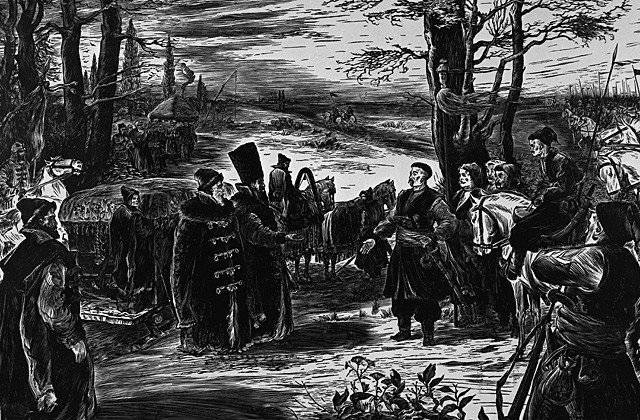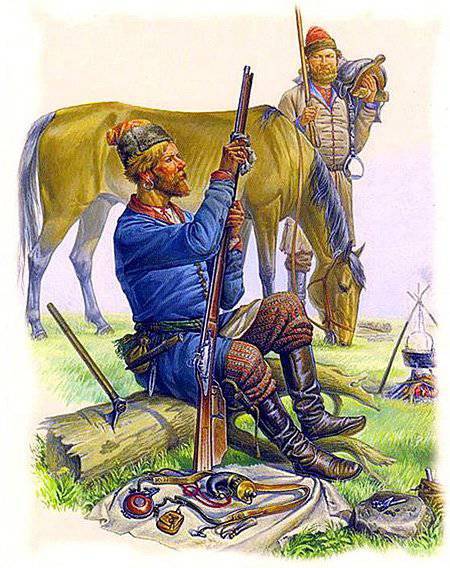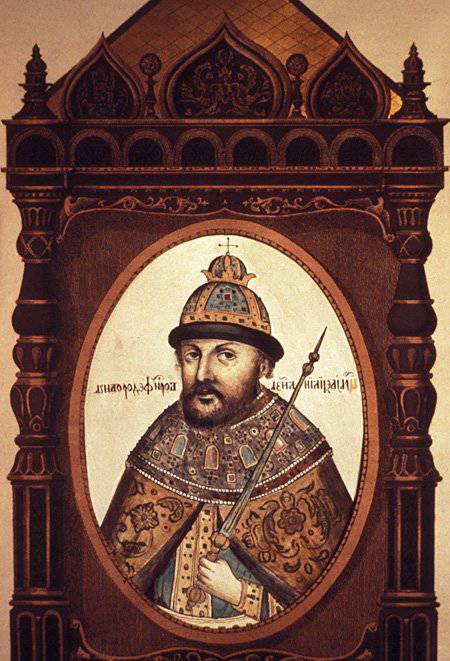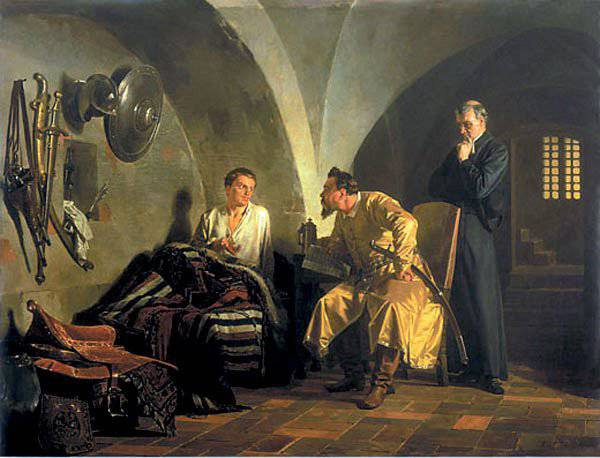Cossack Horde against Tsar Boris Godunov

Cossacks were the main force of the army of the impostor Gregory Otrepiev
The events of the initial period of the Russian Distemper (1600 — 1605 years) are commonly regarded as the struggle of three political forces: the Tsar of Moscow Russia Boris Godunov, the political allies of the impostor Grigory Otrepyev — governor Yuri Mniszek and other Polish gentry, as well as the Polish king Sigismund III. The tradition of such a hierarchy of protagonists of the beginning of the Troubles dates back to the official ideology of the Romanov dynasty that reigned in Russia from the 1613 year. The kings of this dynasty, which was not too high-born and seized the Russian throne thanks to external circumstances, did not want to include in the official chronicle of Russia the impartial truth for them. The truth is that the Romanov dynasty completely owes its accession to Moscow to military actions and the arbitrariness of the Cossack people.
Romanov seemed to be a more prestigious version, that they received power from the hands of the nationwide Zemsky Sobor, which de crowned the struggle of all sensible people of Russia against the crimes of Tsar Boris Godunov and the arbitrariness of the Polish interventionists. The Cossacks, with their reputation as congenital adventurers and amateurs, on occasion to plunder the Great Russian sister, under the department of "sensible" passed with great difficulty. Consequently, their active participation in the events of the Troubles should, in modern terms, be somewhat retouched.
Anti-Kazak Sovereign of All Russia
The Russian poet Maximilian Voloshin called the emperor Peter I "the first Bolshevik on the throne". The characteristic, although figurative, is exceptionally accurate. If so, then the tsar of Moscow Russia, Boris Godunov, can be poetically called "the first nestling of Petrov's nest." Indeed, all the major internal political undertakings of Tsar Boris were the forerunners of the more consistent, decisive, and invariably bloody reforms of Peter.
Having completely taken over the reigns of the Russian state in the year of the death of Ivan the Terrible (1584 year), Boris Godunov proved himself as a smart creator of the state, a talented builder and an experienced diplomat. By order of Boris Godunov, the White City was built in Moscow - a fortification of a scale unique to Europe. In 1602, Smolensk completed the almost impregnable Smolensk fortress, which later became the main outpost of Russia on the western borders. Under Tsar Boris, the first socio-economic description of Muscovy was made, the first map was drawn up. Under him, the first regiments of the “foreign system” —the prototype of the future military creation of Peter I — were established. Godunov brilliantly, with little blood, ended the long Russian-Swedish war (1590 — 1593 years). According to the Tyavzinsky peace treaty, Russia regained Ivangorod, Yam, Koporye - almost all the lands seized by Sweden as a result of the unsuccessful Livonian war for Russia.
Boris Godunov, to the great misfortune for the whole country, was persecuted by evil fate: the absurdity systematically spread by boyars-slanderers about the responsibility of the Godunov family for the death of Tsarevich Dimitri, the younger son of Ivan the Terrible. This boy, a patient with a very severe form of epilepsy (the last attack before his death lasted continuously for three days) fell during a regular seizure of convulsions on a sharp narrow knife, which he played “poke”. Godunov very thoroughly investigated the case of the death of the prince, and the main investigator who worked for almost three months was the main political opponent of the Godunovs - Rurikovich by origin, Prince Vasily Shuisky.
Tsar Boris perfectly prepared for the coming reign of his son Fyodor, who, having managed to rule in Russia, could probably anticipate the "bone-cutting" reforms of the extravagant Peter I. Intelligent, strong-willed, diversified, enjoying excellent health Fyodor Godunov could become the best autocrat for the whole history Rus-Russia. Could. But he did not ...
Fyodor Godunov was brutally murdered on 11 on June 1605 of the year by order of the criminal clique of Russian boyars, led by Vasily Golitsyn, Bogdan Belsky and Peter Basmanov. The renegades tried to buy the innocent blood of an “enlightened prince” the nearest place in the retinue of the rapist and murderer, the rootless “Lyashsky thief” Gregory Otrepiev. Surprisingly, until the end, only hired German officers remained loyal to Tsar Fedor Godunov, who, unlike the Muscovites, did not lose men's honor and human form.
What was the root cause of the rapid extinction of the dynasty of the Godunovs - a dynasty that gave so good hope and so unkindly collapsed? This reason, as it seems, was the consistent anti-Kazak policy of Tsar Boris Godunov, who tried as much as possible to diminish the military power of the Cossack people and seize Cossack lands. In his anti-Kazak policy, as well as in many other initiatives, Boris Godunov was the predecessor of Peter I, who drowned in blood, as you know, the Zaporozhian Sich and threw on the Army Don strangulation of the state military tax. In the events of the Troubles, in the words of Leo Tolstoy, the Cossacks "became a fuse in the Russian barrel of gunpowder."
The oldest Slavic people of Eurasia
The official history of the Russian Empire tried to affirm in the public opinion a version that the Cossacks were, they say, not an original people, but descendants of Russian peasants who had escaped from serfdom and the state tax on the Dnieper and Don. True, this version did not explain in any way why these “peasants” in the most gracious lands of the south did not cling to the usual for them, logically, plows and harrows, but for muskets and sabers. It was also unclear how the “peasants” could have been approved by the Troops for approval of the law on unconditional punishment by the death of any Cossack who dared to plow the land and grow grain.

The familiar mythological formality of the official version of the origin of the Cossack people was already clear to the court historian of the House of Romanov Nikolai Karamzin. “Where the Cossacks came from,” wrote Karamzin, “is not precisely known, but in any case it is older than the Batu invasions in the 1223 year. These knights lived in communities, not recognizing the power of neither Poles, nor Russians, nor Tatars. ”
If you believe Karamzin, and you don’t have to doubt the knowledge of the largest Russian historian, it turns out that the Cossacks are the oldest Slavic people in south-eastern Russia. This conclusion is obvious if only because all ethnological scholars attribute the beginning of the ethnic folding of modern Russians and Ukrainians to the time “after the Batu invasion,” that is, after the defeat of Kievan Rus by the Mongol troops and the beginning of independent existence of North-Eastern Vladimir Russia. And if the Cossacks, according to Karamzin's authoritative opinion, are “older than the Batu invasions,” how can they be descendants of Russian peasants enslaved only at the end of the 16th century?
At the end of the reign of Ivan the Terrible and much later, the Cossacks, Zaporizhzhya and Don, were essentially a single ethnosocium, and the Zaporizhian Sich on the Dnieper was its territorial, cultural, and political center. Just look at the excellent, old letters of Parsun (portraits) of Don Atamans of the 16th — 17th centuries, exhibited in the Starocherkassk Museum of Cossack History, to understand that, in the anthropological type of persons, hairstyles and clothes, the Don people even in the middle of the 18th century were no different from Zaporozhians.
Tsar Ivan the Terrible viewed the Cossack Army State as a dangerous and unpredictable neighbor, with whom it was easier to be friends than to fight. The Zaporizhian Sich was far away from Russia, the Tsar's emissaries traveled very rarely to her, but here the Don Cossacks were practically near Moscow - in the 16th century, Don Cossacks of the Chiga clan lived even north of modern Voronezh. The need to hide behind the Cossacks from the raids of the Crimean and Volga Tatars, and even more the fear of Muscovy to become the target of predatory Cossack military raids, gave rise to the annual payments to the Cossacks of “state holidays”, that is, in fact, a veiled tribute.
This tribute to Moscow Russia to the Great Don Army was rather large at that time and was paid mainly by gunpowder, lead and grain bread. The size of grain supplies to the Don in the first half of the XVII century reached 200 tons, having increased by the end of this century to 500 tons. In addition, the Donians annually received from the treasury of Muscovy: 5 thousand rubles (a very large amount for that time), 430 halves of German Hamburg cloth (at a price of 5 rubles 50 kopecks for half), 230 pounds of guns and gun powder (1 pounds equal to 16 kilograms ), 115 pounds of lead, 10 pounds of iron forgings for sabers, 6,5 thousands of quarters (1 a quarter equal to 210 liters) of rye flour, 500 buckets of wine (1 bucket - 18 liters). As you can see, the payment of Muscovy donts for their peace was very generous in the era of Ivan the Terrible.
Another kind of “sovereign's salary” was the procedure for accepting the Don Winter Village in Moscow at Grozny. Usually, once a year, in the winter, Don Cossacks sent their embassy, called Zimnaya Stanitsy, to Moscow for a “sovereign leave”. This embassy included from 120 to 150 generic Cossacks belonging to a noble Don foreman. Since the trip to Moscow was associated with various privileges and privileges for its participants, every Cossack sought to get into the composition of the Zimnoy stanitsa.
Upon arrival in Moscow, the Cossacks were primarily sent to the Ambassadorial Order, the then foreign ministry: the date of the audience with the Great Sovereign was agreed upon. On the appointed day in the Small Throne Room, the Zimniy stanitsa was received by the king himself according to the rank of the foreign embassy. Then followed a sumptuous dinner with the participation of the king, at which every member of Zimnaya stanitsa received as gifts weapon, money, silk taffeta, German cloth, sometimes sable. The Ataman of the village was personally presented with a silver ladle encrusted with gems or a rare work piece. The Cossacks lived in Moscow on the "sovereign's salary" almost all winter and before the spring, receiving a "sovereign leave" for the Army, and gifts to the road, went home.
"And the Cossacks do not sell protected goods!"
As the state power of Muscovite Rus increased, these relations of veiled dannici began to annoy the Muscovites more and more. With the entry of Boris Godunov in 1598, the throne of the “autocrat of All Russia” was decided to completely revise the Russian policy towards the Cossack people.
The first anti-Kazak law, approved by Boris Godunov, eliminated for the Cossacks the right of duty-free trade on Russian territory. This right was given to the Cossacks "forever and ever" by a special decree of Ivan the Terrible - as a gift for the military zeal of the Cossacks in conquering Kazan and Astrakhan, which ultimately ensured the success of these military expeditions of Russia.
In the future, Tsar Boris constantly strengthened the anti-Kazak trade rules, as well as the responsibility for their non-fulfillment: Russian people were forbidden to sell gunpowder and lead to the Cossacks, and bread from the year 1601. As the famous Russian historian S.M. Solovyov, in 1601, Tsar Boris “ordered the children of the boyar Ryazanians to ask: who to Don to the atamans and the Cossacks sent wine, potion, sulfur, saltpeter and lead, food, armor and helmets and all kinds of stocks, protected items?”.

The investigation found out that the tribal clan of the Ryazan nobles Lyapunov was engaged in this. The eldest of the Lyapunovs, Zakhara, was "mercilessly carved with a whip." Subsequently, Tsar Boris, probably, was very sorry for this execution, because the Lyapunov brothers in the years of the Troubles became the consistent and implacable enemies of the Godunov dynasty.
In 1602, Russian legislation began to demand from the provincial governors of the regions bordering the Don Army, the unconditional arrest of all Cossacks on the territory of Muscovy with subsequent imprisonment in prison for investigation of their origin. At the same time, all and all sorts of forms of “state leave” for the Don Cossacks were abolished, which, of course, practically eliminated the procedure for accepting the Zimnykh villages of the Don Army in Moscow.
All these activities of the administration of Boris Godunov in a new way highlighted in the consciousness of the Cossacks a large-scale construction campaign begun in 1585 year on the erection of supporting fortresses and even Muscovite cities in the Cossack lands. In 1585, for the first time on the land of the Cossack Prisud, the Russian fortress Voronezh was built. In 1586, Livny and Samara were built, then Tsaritsyn (1589) and Saratov (1590). With the construction on Donets in 1596, Belgorod, and in 1600, the fortress Tsarev-Borisov, Moscow Russia actually completed the strategic coverage of the lands of the Don Cossacks with a chain of fortified forts and fortresses.
At the beginning of this building campaign, the Donians favorably perceived the arrival of the Muscovites in the Cossack lands. However, after the introduction of discriminatory trade rules and police measures against the Cossacks by Boris Godunov, the entire Don Army saw an attempt to launch a decisive attack on the Cossacks' original freedom in the building initiatives of Moscow Russia. And in the hitherto quiet for the Muscovites, the Don was highly leapt by the ramparts of Cossack rage.
Damn defrocked and Lyashsky thief
The story of the monstrous cherk (monk) gryshka Otrepiev’s adventure begins in the middle of 1600. At the very beginning of this year, Tsar Boris Godunov became seriously ill. By the fall, the king’s state of health had become critical: he could not receive foreign ambassadors or even walk on his own. In Moscow, talk began about the already predetermined death of the autocrat.
During this period, the numerous, although not too well-born, Old Moscow clan of the Romanovs-Zakharyins almost began to openly prepare a coup d'etat. The initiator of the attempt on the "sovereign word and deed" was the well-known Moscow dandy Fyodor Nikitich Romanov, who later became Filaret, the patriarch of Moscow and All Russia. Of the numerous Romanov estates, battle serfs and dependent nobles began to arrive in Moscow. One of them was Yury Bogdanovich Otrepyev - the future Lzhedmitry I, who is also the sheer and “Lyashsky thief” Grishka.
Boris Godunov, who had dried up from the disease, nevertheless managed to prove that an attempt to remove the skin from a not yet dead lion is always punishable. On the night of October 26 1600, the archers surrounded the Romanovs' estate on Varvarka and began the assault. Several dozen supporters of the Romanovs were killed in the assault, and the main instigators of the coup appeared in court.
The court of the Boyar Duma, in view of the obvious evidence, found the Romanovs guilty of the attempted murder of the tsar and high treason. Punishment for such a crime could only be the death penalty. Boris Godunov hesitated for a long time, but in the end, apparently due to his illness, he decided to spare the traitors. By this he, who had hitherto not been mistaken in major issues of domestic policy, signed the death sentence of his own dynasty. A subtle intriguer and ambitious Fyodor Romanov was forcibly tonsured as a monk, and his relatives — the brothers Alexander, Mikhail, Vasily, Ivan, as well as the son-in-law of the princes Cherkassky and Sitsky — were sent into exile.
All these events did not affect Grishka Otrepyev, who, because of his ignorance, could not count on forgiveness, but only on the executioner's block. Miraculously escaped from the Otropiev Romanov estate, he quickly adopted the monastic status, the only method of the Middle Ages, which allowed him to escape from the chopping block. His further wanderings are well known: Otrepiev fled from the Chudov Monastery to Galich, then to Murom, and then to the Polish-Lithuanian Commonwealth. Here, in the estate of the richest magnates Vishnevetsky, Otrepiev talentedly imitated a serious illness and confessed to the “mortal core” that he is the same Tsarevich Dimitri, the younger son of Ivan the Terrible, miraculously saved himself from the black wiles of Tsar Boris.
Poles with irony in political intrigues perceived the words of the rogue, and Hryshka Otrepiev for a long time was aimlessly hanging around Poland surrounded by the same traitors as the Khripunov brothers. Apparently, the Poles did not seriously consider the political potential of Otrep'yev, and they did not want to quarrel with the powerful Godunov for the sake of no real support for the adventurer. The matter reached the point that the Polish prince Adam Vishnevetsky finally decided to arrest the pretender and extradite him to Tsar Boris: only the personal intervention of King Sigismund III was saved at the last moment by the cherite Grishka.
Otrepiev’s humiliated position in Crown Poland changed dramatically only after he had pulled the Cossack trump from the greasy sleeve of his cassock. After reviewing the customs and attitudes of the Commonwealth, the outcast realized that he couldn’t boil porridge with the Polish gentry, and therefore made his main political stake on the Zaporozhian and Don Cossacks who were extremely embittered on Tsar Boris.
Mobilization of the Cossack horde
In the spring of 1603, Grishka Otrepiev, unexpectedly for the Poles, disappeared from the territory of Crown Poland. And he appeared in the Zaporizhzhya Sich in the company of the Cossack petty officers Gerasim Evangelik. Several incendiary speeches - and always ready for war and robbery Zaporizhzhya Sich began to boil. Known for their organizational talent, the Cossacks instantly changed the humiliated moans of the monk Gregory to the non-alternative order “Spolokh” - a symbol of the general Cossack mobilization. Sich began to vigorously buy weapons, recruit hunters from the Ukrainian peasant flakes into the Cossack teams. By the end of the year, the scale of the formation of the rebel army of False Dmitry I had already frightened King Sigismund himself: December 12 of 1603 by special decree the king banned the sale of weapons to the Cossacks. The Cossacks did not pay the slightest manifesto the slightest attention.

Since the interaction of Zaporozhye and the Don Cossacks was carried out in that era on an ongoing basis, through the mediation of the Dinsky (Don) Zaporozhye kuren, very soon the Dontsa joined the military preparations of the False Dmitry. Their participation in the upcoming military expedition was not only a “call to plunder of the heart,” like that of the Cossacks, but perhaps a vital measure. By stopping supplies of gunpowder and lead to the Don, and also banning the sale of these goods to the Cossacks, Boris Godunov left the Don Cossacks without any “weapon potion” in the event of war with the Tatars, Nogai and Turks. Under such circumstances, the Don people could not accept this situation.
The genius of Pushkin perfectly conveyed the atmosphere of sincere willingness of the Don to go to the end in the war with the hated Boris Godunov. In the drama of the same name, the Cossack emissary at Otrepiev’s headquarters, Ataman Korela, to the impostor’s question: “Who are you?” Answers:
Cossack, I have been sent to you from Don
From the free troops, from the brave chieftains,
From the upper and lower Cossacks ...
And he immediately receives political guarantees for taking full account of the vital interests of the Cossack people of the Don:
We thank our Don army.
We know that now the Cossacks
Unfairly oppressed, persecuted;
But if God helps us enter
On the throne of the fathers, then we are of old
We wish our faithful free Don.
It is clear that, having heard such or similar words from the False Dmitry, the ataman Andrey Korela immediately recognized the renegade as the “true sovereign”. As the famous historian of the Cossacks V.D. Sukhorukov, the ataman Korela “in the name of all his fellows beat the impostor with his brow as the legitimate sovereign, presented gifts and reassured all the Cossacks with loyalty and devotion.”
Having received a corresponding report from Korela, the Don Troop Circle rejoiced and, through the accidentally captured boyar Semen Godunov, then released to Russia, ordered the Russian autocrat to be conveyed the following words: “Our persecutor Boris! Soon we will be up to you, on Moscow, with Prince Dimitry. ”
Boris Godunov was very excited about this message. He immediately sent to Don his close boyar Pyotr Khrushchev with an extract of the decision of the Boyar Duma about the death of the present Tsarevich Dmitry, and also with a proposal to immediately restore the “sovereign leave” to the Don. Alas, this sensible offer is too late. Already mobilized Don, together with Zaporizhzhya Sich, was ready for war and wanted only war. Doners, without reading, immediately broke the Tsar's statement, and poor, beaten Khrushchev, imprisoned in chains and put backwards on a horse, sent to False Dmitry. Seeing the impostor, Petrushka Khrushchev, shedding tears, immediately recognized in him the "sovereign son Dimitri."
However, Otrepyev’s mishandling of Khrushchev and other Moscow lackeys was no longer necessary: his well-armed rebel army crossed the Dnieper and approached Moravsk, the first Russian fortress on its way to Moscow. An inexorable Cossack horde was advancing into Russia, which the Godunov dynasty, undermined by the betrayals of the Moscow boyars, could not stop.
- Nikolay Lysenko
- http://rusplt.ru/policy/kazaki-Godunov-8758.html?re_test=1&utm_expid=56431738-4.2CnpLaNQSWiXRNLa6uxNSg.1
Information